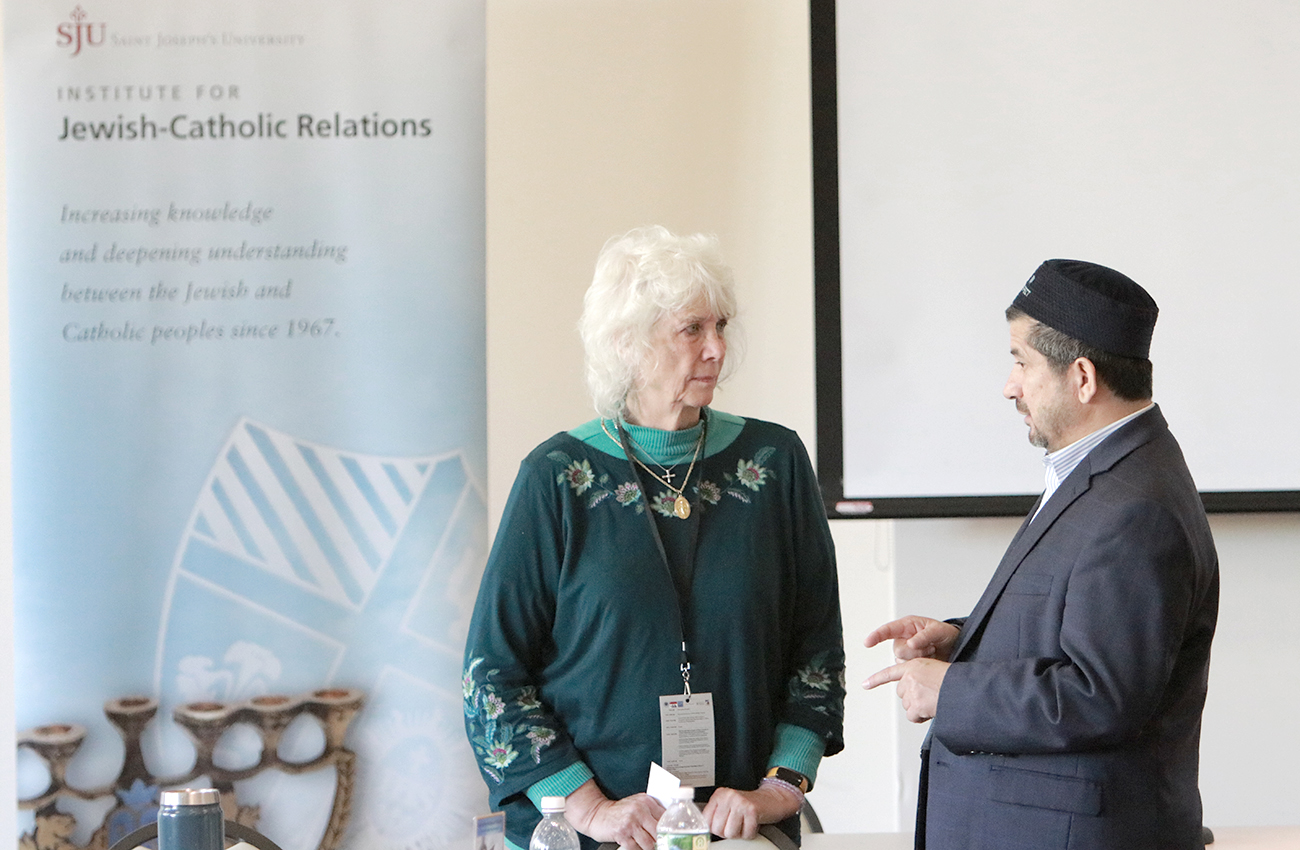He may not have been able to deliver them himself in person, but the powerful words of Cardinal Wilton Gregory, Archbishop Emeritus of Washington, D.C. about the call for friendship across faith traditions to bring peace rang true for more than 100 Catholic, Jewish, Muslim and other Christian leaders from across America who gathered Oct. 22 at St. Joseph’s University in Philadelphia.
“Pope Francis spoke often of friendship, calling it, ‘One of life’s gifts and a grace from God.’ It is a deliberate commitment to each other,” Cardinal Gregory wrote in a speech delivered to those who came to “Nostra Aetate — Facing the Future as Friends: Catholics, Jews and Muslims.”
The conference marked 60 years since the groundbreaking Vatican document in 1965. Nostra Aetate redefined the Catholic Church’s relationship with other faiths.
>>>SEE RELATED – Photos: Faith Leaders Unite to Mark 60 Years of Nostra Aetate
“The Torah reminds us to love the stranger, ‘for you were strangers in the land of Egypt.’ Jesus said, ‘I no longer call you servants, but friends.’ And the Quran teaches, ‘O mankind, we created you from a single pair, of a male and a female, and made you into nations and tribes, so that you may know one another.’”
Father Dennis McManus, a priest in the Archdiocese of Mobile, Alabama who serves as delegate for Jewish affairs for the United States Conference of Catholic Bishops, conveyed all of the cardinal’s speech at the event.
Cardinal Gregory missed the event due to illness within his family.
“The Church embraced dialogue on many levels and in many ways (through) theological exchange, joint action, shared life, and spiritual encounter,” the cardinal’s text continued.
“Dialogue requires humility, the willingness to listen as well as to speak. It requires honesty, the courage to acknowledge difference without fear. It requires perseverance, the patience to continue when progress is slow or misunderstanding persists.”
Nostra Aetate, promulgated by Pope Paul VI in October 1965 during the Second Vatican Council, opened doors for greater dialogue through embracing shared values, understanding differences with greater respect, and rejection of discrimination.
Archbishop Nelson J. Pérez of the Catholic Church of Philadelphia helped open the five-hour conference consisting of prayer, talks, discussion, and a meal shared with strangers who quickly became friends across religious lines.
“The growth of relationships with our three faith traditions around the world has been an important work and hope of the Church. The Holy See presented to the world this document, Nostra Aetate, (and) 60 years later we’re still unpacking it,” said the archbishop.
“What brings us all together is what St. Augustine spoke about many centuries ago: The human heart was made for God and it will be restless until it finds its rest in God. We all strive for the same thing, to find rest in God and to contemplate divine truth.”
Rabba Rori Piecker Neiss, the senior vice president for community relations with the Jewish Council for Public Affairs, praised Nostra Aetate as a way of revealing that wounds from centuries of discord can heal and theology can grow.
She also called for the document to be a stepping stone for a dialogue of theology to expand into a dialogue of life.
“If we’re going to have a true engagement of our traditions, we need to be vulnerable about where our traditions exist in the modern world. We need to make our relationships relevant not only at the high level and not only in what we think we need to say, but also in the truth of our lived reality,” she said.
“How can Nostra Aetate help us with that today? This document, short and profound, teaches us that identity and openness are not enemies. The Church did not abandon its faith when it turned toward the Jewish people in humility.”
Islamic Studies Professor Dr. Zeki Saritoprak of John Carroll University, a Jesuit university in Cleveland, Ohio, shared how the document built a deeper developing relationship with Catholics and the Muslim world, one built upon by subsequent popes including Pope Francis and Pope Leo XIV.
“What does Nostra Aetate say? Briefly, the Church regards the Muslims with esteem,” Saritoprak said.
“To know one another and benefit from each other: That is the purpose of our diversity. God could have created one community. It would not be beautiful like this. This diversity is beautiful.”
Cardinal Gregory’s speech echoed the words of Rabba Neiss and Saritoprak, believing dialogue should grow and evolve into deeper interpersonal and interreligious commitment.
“While we celebrate the past 60 years, we must also remember that Nostra Aetate was not the end in itself, but the beginning of a process that continues to unfold. If God enters into dialogue with humanity, how can the Church retreat from such a calling?” the cardinal wrote.
“Continue to walk together. At a time when the world feels fractured, what gives me hope is precisely this, that we are here together. We are still talking. We are still listening. Friendship does not mean that we will always agree, but it does mean that we remain committed to each other.”
PREVIOUS: White Coat Mass Celebrates Catholic Doctors in Philadelphia
NEXT: Our Lady of Confidence Retreat Reaches 60 Years of Love for Adults with Disabilities



Share this story